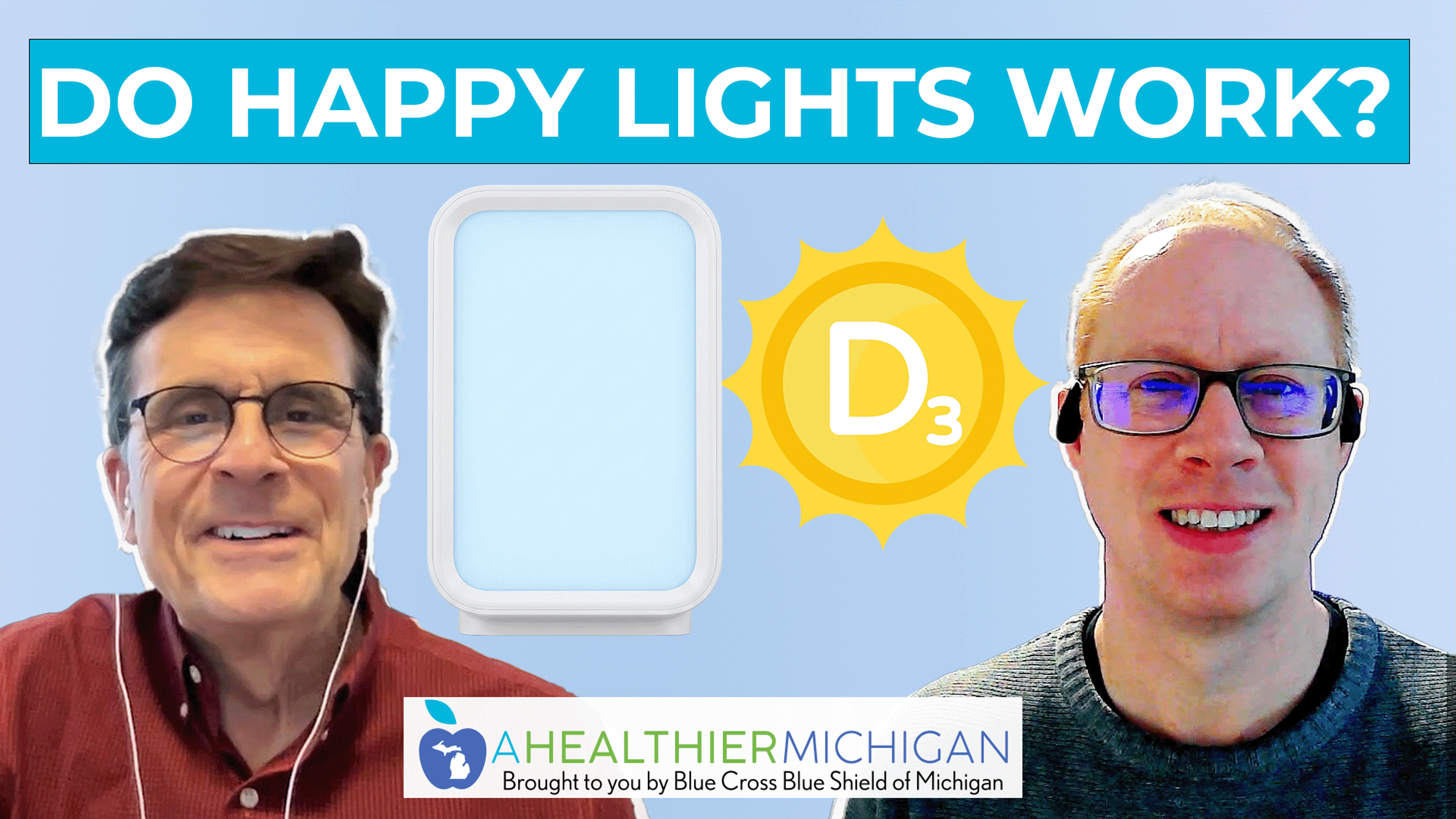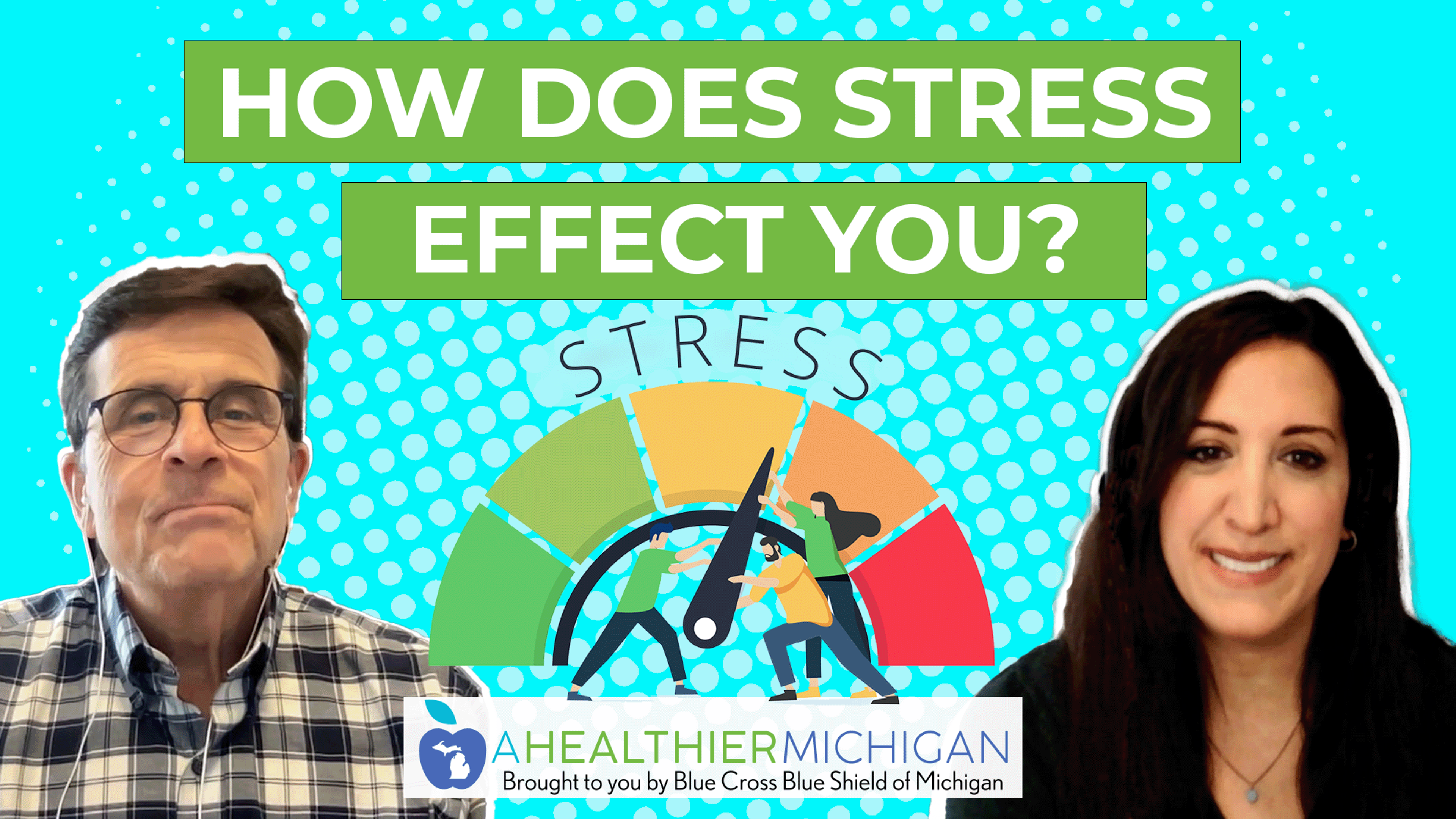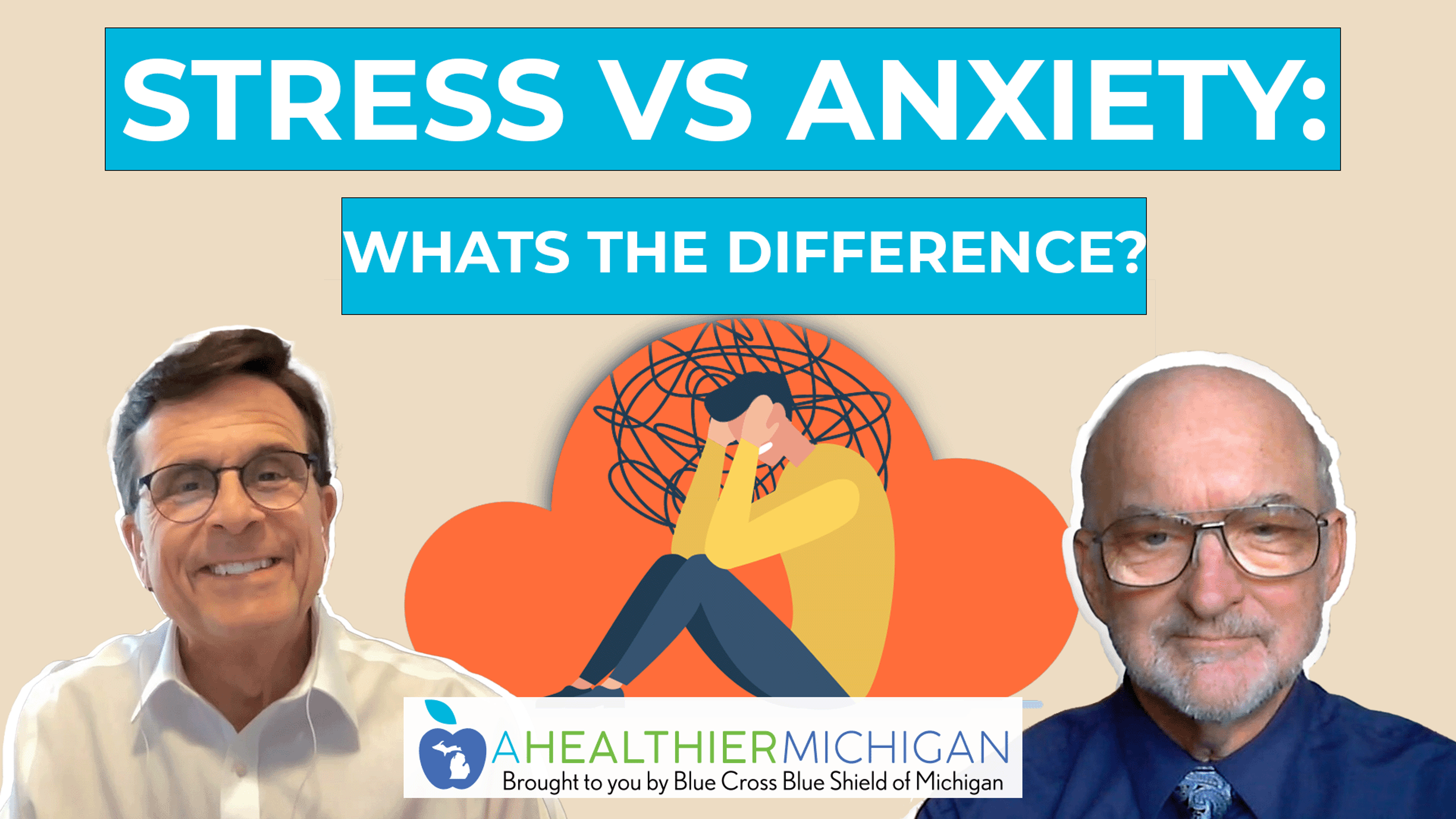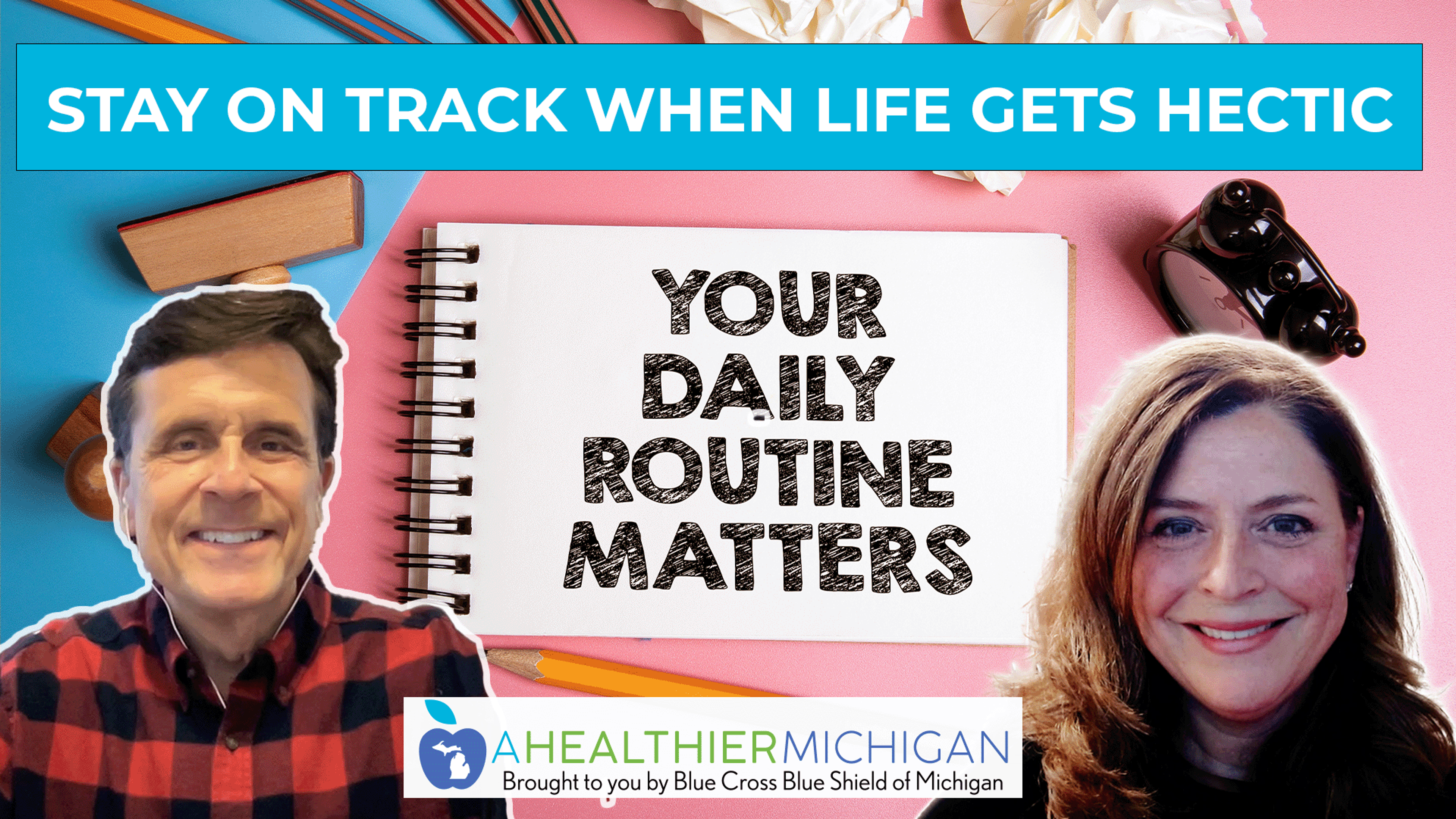How to Ease Summer SAD
| 1 min read

00:00
00:00
About the Show
On this episode, Chuck Gaidica is joined by Dr. Kristyn Gregory, medical director of behavioral health for Blue Care Network of Michigan and Blue Cross Blue Shield of Michigan. Together, they discuss the impact of summer seasonal affective disorder.
In this episode of A Healthier Michigan Podcast, we explore:
- What is seasonal affective disorder (SAD)?
- Who’s at risk for SAD?
- The difference between summer and winter SAD
- How to manage SAD symptoms
- How diet can help or worsen SAD symptoms
- The three chemicals that affect mood
- Finding professional treatment for SAD
Transcript
Here is the full transcript of this episode. You can listen to the audio version on streaming platforms or watch on YouTube.
Chuck Gaidica: This is A Healthier Michigan Podcast, episode, 58. Coming up, we discuss how the warm weather could be affecting our moods.
Chuck Gaidica: Welcome to A Healthier Michigan Podcast, the podcast dedicated to navigating how we can improve our health and well-being through small, healthy habits we can start implementing right now. I’m your host, Chuck Gaidica. Every other week, we sit down with a certified health expert from Blue Cross Blue Shield of Michigan, and we dive into topics that cover nutrition, fitness, a whole lot more. And on this episode, we’re talking about Summer Seasonal Affective Disorder and how, for some of us, that can take a toll on our mental health. Just when the sun comes out, you think everything is brighter and better, well, maybe for some that’s not the case. With me, today, is the Medical Director of Behavioral Health for Blue Care Network of Michigan and Blue Cross Blue Shield of Michigan, Dr. Kristyn Gregory. How are you today, doctor?
Dr. Gregory: I’m great, Chuck, how are you doing?
Chuck Gaidica: I’m doing well, thank you. And I know that you’ve got so much varied experience in your training with talking to adults, and children, and adolescents, and your psychiatry practice has been private, and now with Blue Cross. But this whole idea is a bit new to me, that we would enter into warmer weather months, longer days, sunshine, I mean some cooler mornings which lead to a delightfully warm, not even really, really hot yet afternoons. So, you would ask the first question, like, “What’s wrong with summer? What’s not to love here?” But you’re saying that there is something that we need to be on the lookout for, right?
Dr. Gregory: Right. And most people have heard about Seasonal Affective Disorder or SAD effecting us in the winter when we don’t get a lot of sunlight. But what people don’t, generally, hear about is that sometimes the opposite is true. Sometimes too much sunlight in the summer months actually can cause the same triggers for depression. It’s less common, about only 10% of the people that have Seasonal Affective Disorder depression actually have it in the summer months.
Chuck Gaidica: So, let’s talk about that. We’ll go back because we’re also familiar with winter here in Michigan. You get to that point where the cold air is coming across the Great Lakes, and the clouds set in. They blow in from the North and West and they kind of settle around from November to maybe not even March, maybe it’s more like May we’re typically, on average, kind of stuck in the gray. If Seasonal Affective Disorder gets you in that period of time, are you more apt to have an issue in the summer or are they completely unrelated?
Dr. Gregory: They are unrelated because the seasonal depression in the summer is more likely to happen to people that live in warmer climates generally. So, people that might summer in Florida might be more likely to have that occur in the summer as opposed to the winter.
Chuck Gaidica: Yeah. And what is it that’s actually happening with SAD, if we back up for just a minute to the winter thing? Because we’ve heard about that, let’s run to the health food store and get melatonin or something. Or let’s put in a special light box that gives us more raise of UV, whatever. So, we’ve kind of heard about that, but what is it that’s actually happening that affects us?
Dr. Gregory: Right so, we have circadian rhythms, which is our sleep/wake cycle. And, within the brain, there is a master clock called this suprachiasmatic nucleus.
Chuck Gaidica: Wow.
Dr. Gregory: Yeah. So, it gets direct input from the nerves in your eyes, so when light comes in it triggers that part of your brain to turn off the release of melatonin, which is the sleep chemical, which we’ve all heard of when we go to the health food store. And so, it turns off melatonin, and turns on cortisol, which is actually a stress hormone. So, when less light comes in we get more melatonin, and when more light comes in we get less.
Chuck Gaidica: And so, that can be a big problem for a lot of people as we head through the winter. And that’s why we hear of winter vacations, and that’s why people want to find some sunshine, even if they’re skiing up North, et cetera. So, we get that. So, now we move into the warmer weather months you would think, “Well, bada bing, bada boom, it’s all fixed,” but not necessarily for some people. It’s not always an upside to the bright sunny day.
Dr. Gregory: No, and I think when the sun is out until nine o’clock at night, as it has been lately, then people go to bed later. So, they’re staying up later, past nine, and so their body isn’t producing melatonin. There might be schedule changes because they’re on vacation, school’s out, stress about vacations, stress about maybe being off for the summer, and not being able to work because you’re a teacher. So, bunch of different things.
Chuck Gaidica: And that also includes having hunkered down in your house and kind of trying to come out of where we’ve been for the past couple of months, talk about a stressor.
Dr. Gregory: Yeah, exactly. And I think a lot of people might be more apt to suffer from this this summer because all of a sudden we’re like, “Oh, you got to get out. We can get out.” It’s kind of an exciting time, but it causes schedule disruptions as well. And there’s been financial issues with people.
Chuck Gaidica: Oh yeah. Well, I mean think about it, when you talk about financial issues I mean, what we’re coming out of it can be anything from something dire like job loss, to just peeking in on your retirement plan, to turning on the channel and seeing the stock market is doing well, to being your kids are affected. So, I mean, there’s so many different inputs that are possible here that are really a bit out of your control.
Dr. Gregory: Right, it’s been crushing to a lot of folks, both their loss of work, and as well as being quarantined in your house for the last three months.
Chuck Gaidica: Yeah. So, the challenges in the summer can they include that you’ve got a spouse, or someone in the house that thinks because it is a brighter, beautiful, sunny day that it’s just easier to snap out of it, whatever it is? Like, “Come on, it’s a bright day, let’s go.”
Dr. Gregory: Oh, for sure because, like I said, most people have heard of people getting the winter blues, but the summer blues doesn’t make sense to a lot of people. It’s sunny out, you should be happy. But that excess light exposure and the high temperatures associated with it can affect you. As well as people have had a lot of together time, and they have more in the summer. Maybe both people are off work, and everybody’s at home together can lead to significant stress at home as well.
Chuck Gaidica: So, you’ve given this general term of summer blues, tell us what that may be, so we can be on the lookout for ourselves, and also for our children, or other members of the family in the household. What are the summer blues?
Dr. Gregory: So, as opposed to the winter blues, where we see an increase in appetite, and usually weight gain and sleepiness, the summer SAD, we might see insomnia, difficulty falling asleep as opposed to too much sleep, loss of appetite, loss of weight, anxiety, irritability, which is likely associated with the higher cortisol levels, poor concentration.
Chuck Gaidica: And half of those things, I have to admit to you when you say that to me, and again, the asterisk behind my name would be, I don’t suffer from this that I’m aware of, but outside of insomnia, and as some of the other things that are obviously not good, when you tell me that summer could give me a loss of appetite, which leads to weight loss, because I’m riding my bike more, or I’m working at it, that doesn’t seem like there’s a downside. But this is something that could be affecting somebody where they really realize it’s out of their control, really.
Dr. Gregory: Yeah. And, I mean, to have a seasonal affective disorder depression, the main symptom would be depression. So, I should add with summer and winter Seasonal Affective Depression for longer than two weeks would be the cardinal symptom.
Chuck Gaidica: Do the summer blues always lead to depression? Is it basically categorized from your standpoint as depression, or is that still another separate issue?
Dr. Gregory: No. I mean, to have a seasonal affective disorder it’s a type of depression. So yes, it’s not just having a bad day, or you don’t have your appetite one day.
Chuck Gaidica: Right. So, as we look at what we’re supposed to do, then, if we think we’re suffering from summer blues, or somebody in the family is just going out for a walk in the sunshine, doesn’t sound like the antidote. I mean, so what do we do?
Dr. Gregory: It might, if we prioritize sleep first, that’s the most important thing. Going to bed and waking up kind of at the same time is really crucial to control over a lot of mental health issues, including depression. So, to maintain that sleep schedule, even in the summer when you don’t have school or you don’t have other things that you necessarily need to get up for, then it’s important to maintain that sleep schedule. Sometimes use blackout shades, keep your room as cool as you can. And that makes your brain say to produce more melatonin at night because there’s not that light coming in.
Dr. Gregory: Another tip is to not be in front of bright lights, like cell phones, tablets, televisions, prior to going to bed. Usually, we say for a good hour before going to bed, you want to shut all the bright lights that would go into your eyes, and trigger your pineal gland to stop producing melatonin because you want it to produce melatonin when you go to sleep.
Chuck Gaidica: And while that advice is so common sense, you realize how many people are binging their favorite whatever show, right up to the time they’re going to bed. Or they’re taking their iPad-
Dr. Gregory: Me included.
Chuck Gaidica: Right. Are you? Yeah, because what else have we been able to do? So, that’s a complication that it just seems so normal. “Well, I’ll take the iPad and I’ll just check emails before I go off to sleep.” And we know we can dial down the light and all that stuff, but not everybody is doing that.
Dr. Gregory: No, it’s hard to do that especially lately. There’s not been a lot of other outdoor activities to go to. Gyms, a lot of people use workout to reduce stress and they haven’t been able to do that either.
Chuck Gaidica: And you did say something a few minutes ago about the stressors that are included in having been hunkered down. I think about my son, and daughter-in-law, and our two granddaughters that are five and one. And it’s a joy that we’re going to be able to have them over, but you get to my wife and my age, we’re not really that old, we don’t think we are. And they come over and it’s like, “Wow.” It’s a joy to have them, but I just think my kids have, literally, for months had to … they painted one of the walls in the family room with chalkboard paint, so they could have “preschool.” And they are hunkered down at home, both kind of working from home, and watching the kids, and getting no relief. And you couldn’t really look to us to help because of the nature of what’s happened. And that’s just one super imposed factor on top of all the other stuff. So, there are some things that we’ve got to motor through, and how tough that must be for a lot of people. Just the average stuff we’re dealing with every day.
Dr. Gregory: Right, exactly. And then, you throw a preexisting depression, or a tendency towards that on top of it, and it can become very serious.
Chuck Gaidica: So then, when you talk to someone, or they talk to you about what’s going on in their life, you’re giving them these holistic prescriptions, better sleep, don’t go to bed with your iPad, stop watching TV an hour before.
Dr. Gregory: Right, exercise because that increases serotonin. Eat right, you want stuff high in omega fatty acids: fish, walnuts, chia seeds. Make sure you stay hydrated.
Chuck Gaidica: What does that do? What does the omega fatty acids do?
Dr. Gregory: It’s higher DHA blood concentrations is what it causes.
Chuck Gaidica: And then, you talk about exercise itself, so we can still exercise without a gym, right?
Dr. Gregory: Oh, yes. Usually, I would suggest when it’s hotter out to see if you can exercise indoors in the air conditioning, so you don’t become overheated. Or to do it in the mornings, or evenings when things have closed down, because exercising does increase the production of serotonin, which are the feel good chemicals that are in your brain.
Chuck Gaidica: Yeah. And we all want those. I mean, and people will look to other things to do that. So, when you speak to people who may be suffering from the summer blues, you give them these holistic ideas. What else can you, then, do? Even if it comes to prescriptions, what is the way you would attack this in terms of depression with somebody with summer blues? What are some of the options you have, as a doctor, that we don’t have?
Dr. Gregory: So, if somebody is diagnosed with a major depressive disorder, with a seasonal onset, seasonal pattern we would look towards therapy is one thing, psychotherapy, cognitive behavioral therapy, all the way up to, if the depression is severe enough, different medications that are used to boost the chemicals in your brain that are lowered because of the depression.
Dr. Gregory: So, there’s the three main chemicals in your brain that affect your mood, could be considered to be norepinephrine, serotonin, and dopamine. And we’ve all heard about, well, a lot of us, the SSRIs, which stands for specific serotonin reuptake inhibitors. And so, those increase the serotonin levels in your brain and body. And those would be medications such as Prozac, Paxil, Zoloft, Celexa, and Lexapro. So, that’s one class of medications that psychiatrists use. There’s other combinations that affect the different neurochemicals that might impact serotonin more, or that might impact dopamine more in your brain.
Chuck Gaidica: And when someone is speaking to you, you have that arsenal of things that you can work with, because the word seasonal is attached to this, we’re talking about the summer blues, could it be, because there’s a stigma with any kind of, well, even talking to a psychiatrist could have stigma attached to it, but when it comes to drugs and drug therapy there’s going to be a stigma. Someone will say, “Well, I’ve never been on a prescription for anything. I don’t want to go on one now,” but this could really be a temporary situation if this is seasonal, correct? So, you’re not going on Prozac forever, or something, are you?
Dr. Gregory: Well, I mean, it could be temporary, or it could be that you have a pattern where it worsens in the summer, or worsens in the winter. But that’s why the first steps would be eat right, sleep right, get enough exercise, and keep yourself healthy in that way.
Chuck Gaidica: And isn’t it interesting that what you’re talking about in this arsenal of stuff to go after the summer blues is holistic. I mean, the list is overwhelmingly things that we can do. And I won’t call them common sense because, for some people, they haven’t developed that habit, or it’s harder for them to do. But so much of this can be attacked, it sounds like, with some really basic ideas of making sure you’re hydrated, eating well, exercising, making sure you get enough sleep. That’s encouraging.
Dr. Gregory: It is encouraging. I think another point to make though that if the symptoms are severe, or if you’re severely depressed, hopeless, any thoughts of hurting yourself that it’s important to get treatment right away. There should not be a stigma attached to that because depression is very common. And a lot of people throughout the world suffer with it, and it’s not a sign of weakness. It’s a biochemical process that’s going on in your brain.
Chuck Gaidica: And let me dig into that with you for just a minute, unpack for us, if we’re thinking of ourselves and someone very close to us, the symptoms that we could start to see well before we’re thinking of any kind of suicidal tendencies. But what’s a checklist of things we should start to think about that this is becoming important enough to talk to you?
Dr. Gregory: One of the symptoms would be having depressed mood, feeling down more often than not. For more than a day, a week, two weeks at a time. Noting that you are losing interest or pleasure in doing things that used to be fun for you. Maybe you used to love golfing, and you really don’t want to golf anymore. Feeling hopeless, difficulties falling or staying asleep, or even sleeping too much. Feeling tired and down, and not having a lot of energy. Changes in appetite, including overeating or under eating. Having a lot of bad, negative self thoughts and guilt. Difficulty with concentration, all the way up to moving or speaking slowly, feeling you are in slow motion. And all the way up to thoughts that you’d be better off dead, or thoughts of suicide, or hurting yourself.
Chuck Gaidica: Yeah, and that’s a critical juncture. So, if we’re thinking about ourselves, that’s one challenge. If we’re thinking about somebody else that we’re close to, or who’s living in the same household, what do you instruct us? What’s the best advice when we get really concerned about somebody else who doesn’t seem to be helping themselves, but yet we have wind of the fact that, maybe all the way up to suicidal tendencies, there’s something going on, what should we do? Do we confront them and say, “We love you, but we understand something’s going on”? Or do we reach out to a professional, like yourself, even if that person isn’t involved? It’s a conundrum, what do I do?
Dr. Gregory: Well, I think that first talking to the person and saying you noticed the symptoms would be the first step. And if you’re worried, obviously, about somebody being acute risk of self harm, or hurting themselves to reach out to a doctor, or your family doctor, a psychiatrist, as soon as possible. I think that listening to people, and asking questions about how they’re feeling, and being an open listener is probably the best step.
Chuck Gaidica: And that still doesn’t have to be in person because, I mean, we just know coming out of this time that we’ve been in, we talked about this in the last episode, I think like Pavlov’s dog, I now think of social distancing when really it’s been physical distancing that we’ve been advised to be part of. Because when you socially distance, when you’re detaching from, we know we can’t touch you, although that’s coming back, but I think that’s been the hardest thing is maybe even just a phone call to somebody who you think is suffering from something is powerful, right? You can at least listen, and learn what’s going on in their life.
Dr. Gregory: I think reaching out to people during this is very important as well, whether suffering with any mental health issues or not, people are very isolated and lonely, and a phone call, a FaceTime call, sometimes all it takes to reach out.
Chuck Gaidica: Yeah. And I’m very curious about this, and you can share what you want because obviously we’re not talking about patients’ names, et cetera. How does this play out in your life? I mean, we just think that psychiatrists must be super people, but all the things you’ve just talked about as a tip of an iceberg for all the stuff, all the inputs of varied life of different people that must come your way, how do you deal with this?
Dr. Gregory: I deal with it the same way I recommend people to. I try to get good sleep, I try to not take work home with me. I am open to reaching out to friends and colleagues, or professional help, if it became all too much. And using a lot of the holistic tools that we talked about, exercise, eating right, getting enough sleep. Not over imbibing, I think that’s another risk that has come down. We’re going to see a lot more substance use issues because a lot of people have been isolated, and have been turning to various substances to assist their mood. However, that actually will cause worsening a lot of the symptoms.
Chuck Gaidica: Yeah, that’s interesting. So, that’s yet another complication that people have been self-medicating in some way, right?
Dr. Gregory: Yeah.
Chuck Gaidica: Yeah. So, as we start to wrap things up, if you were to think of all the things we discussed and if this were a cooking show, I’d say, “Hey, give us some hacks, like what do we do?” But what is the takeaway for us? What do you want to leave us with, so that we should be on guard? What are we looking for again? And what are the great ways we should start to deal with summer blues if, indeed, we think we’ve got them.
Dr. Gregory: I think the main takeaways are that not only can people feel worse in the winter, but we can also have a different subset of people that actually have worsening depression in the summer. And it has different causes in some respects, being that there’s a different rationale for the disruption to your schedule, disruption to your sleep schedule. But the main takeaway points are get good healthy sleep, don’t expose your eyes to bright lights. If you want to sleep healthy practice good eating habits, sleep habits and exercise.
Chuck Gaidica: Yeah. And what you’re saying to us, again, I hate to keep coming back to this, but it really is this could be a segment on heart health, this could be a segment on brain health. I mean, all of the stuff that you’re giving us that is in the arsenal of ways we can deal with summer blues really helps our body, and our lives in so many other ways it just makes sense to go that way.
Dr. Gregory: Exactly. And I think it brings to light too that there isn’t a difference necessarily between brain health, and whole body health. So, the things that we do to keep our body healthy also keeps our brain healthy, and also speaks volumes to the fact that depression, and bipolar disorder are diseases of the brain, and not different from diseases of the body, such as diabetes, or high blood pressure. And a lot of the same things that you can do to assist those symptoms, if you have high blood pressure, sometimes the doctor will advise you to lose weight, or to exercise more. It’s the same thing that we’re advising people to do to assist things that they can do on their own to help with depression, and other mental illness. That’s not to say that the medication doesn’t have an importance. Medication does have an importance, if that’s what the doctor feels will keep somebody in remission or recovery. But there’s also things that you can do on your own to make sure your body is healthy as possible.
Chuck Gaidica: Well, it’s all great advice. And we do encourage people who could be catching this podcast, one way or another, that if they feel they’ve got summer blues that they attack it themselves, but just don’t be afraid to reach out for help and say that, “I need it.” You’re right, that’s something we can all do. And there shouldn’t be any stigma attached to it at all, but sometimes it’s tough for some of us too. And I’m just speaking as a man. I mean, it’s hard enough for me to make a physical appointment once a year. I mean, it’s just some people are wired differently, and so we just want people to be well.
Chuck Gaidica: So, Dr. Gregory is great chatting with you. Thanks so much for all the advice and the input on this, which is a topic that a lot of us maybe didn’t understand until now.
Dr. Gregory: Thank you, Chuck.
Chuck Gaidica: Good to talk to you. That was a Dr. Kristyn Gregory joining us today. She’s Medical Director of Behavioral Health for Blue Care Network of Michigan and Blue Cross Blue Shield of Michigan.
Chuck Gaidica: We’re glad you’re with us. Thanks for listening to A Healthier Michigan Podcast. It’s brought to you by Blue Cross Blue Shield of Michigan. And if you like the show, you want to know more, check us out online. It’s pretty simple, ahealthiermichigan.org/podcast. So, you’ll find all kinds of great resources there. You can leave a review, or rating on Apple Podcast or Stitcher, we encourage you to do that. And you can get new episodes, you can get old episodes, because there are a lot of them now, we’re up to episode 58. All kinds of great topics, and you can carry them out on your smartphone, or tablet. Don’t do it just as you’re going to bed, so there’s no light because we learned that today. Be sure to subscribe to us on Apple Podcast, Spotify, or your favorite podcast app. As always, be well. Thanks for joining us. I’m Chuck Gaidica, take good care.





